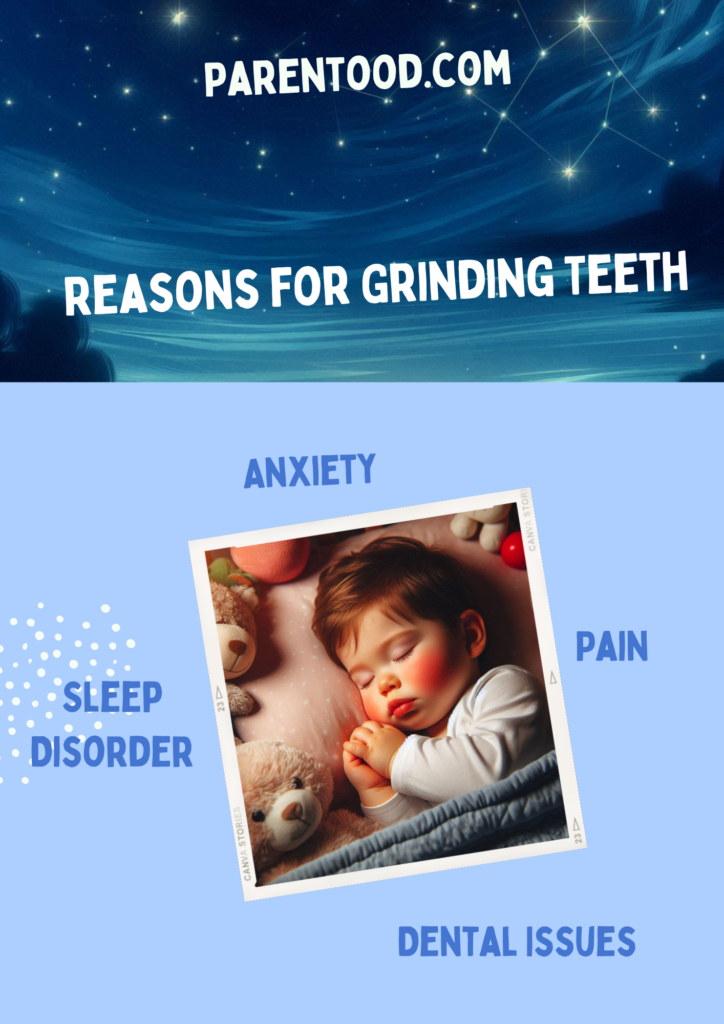Introduction
Teeth grinding, or bruxism, is a common occurrence in toddlers, leaving many parents puzzled and concerned. It often happens during sleep but can also occur during wakeful moments of concentration. Understanding why this happens, what it signifies, and how parents can respond is crucial for safeguarding a toddler’s dental and overall health.
Why Do Toddlers Grind Their Teeth?
- Developmental Reasons
- Bruxism is often linked to the process of a toddler’s teeth and jaw developing. As they adjust to new teeth or an evolving bite, grinding may help them find a comfortable position for their growing dental structure.
- Exploration and Habit Formation
- Toddlers explore the world in many ways, including how their teeth fit together. Grinding may be an experimental behavior as they discover their jaw’s movements and alignments.
- Stress or Anxiety
- While it may seem surprising, toddlers can experience stress or anxiety, often caused by changes in their routine, such as starting daycare or meeting new people. Grinding may be their way of coping.
- Sleep Disorders
- Bruxism is sometimes associated with sleep disruptions, such as restless sleep or even sleep apnea. It may also occur during the transition between different sleep cycles.
- Pain or Discomfort
- Teething pain or ear infections can lead to grinding as toddlers seek relief by clenching or moving their jaws.
- Neurological Factors
- In rare cases, teeth grinding can be linked to underlying neurological conditions or developmental disorders. If the behavior is excessive or accompanied by other symptoms, professional evaluation is essential.
What Does Teeth Grinding Indicate?
Teeth grinding is not necessarily harmful in toddlers and often resolves as they grow. However, it can sometimes indicate:
- Dental issues such as misalignment or bite problems.
- Emotional distress requiring attention to their environment and routine.
- Physical discomfort, suggesting teething or other health concerns.
Precautions Parents Can Take
- Observe and Record Patterns
- Pay attention to when and how often your toddler grinds their teeth. Note any triggers, such as bedtime or specific events, to help identify possible causes.
- Regular Dental Check-ups
- Schedule dental visits to ensure their teeth and gums are healthy and to rule out any alignment issues. Early detection can prevent complications.
- Promote Relaxation
- Incorporate calming bedtime routines, such as reading, gentle music, or a warm bath, to reduce stress. Addressing emotional triggers can help alleviate grinding.
- Monitor Pain Sources
- If teething or ear infections are causing discomfort, provide appropriate pain relief, such as a teething ring, or consult a pediatrician for advice.
- Limit Stimulants Before Bed
- Avoid sugary snacks, drinks, or stimulating activities close to bedtime. These can increase hyperactivity and possibly lead to grinding.
- Consult Specialists When Necessary
- If grinding is severe, persistent, or causing damage to the teeth, consult a pediatric dentist or sleep specialist. A custom-fitted mouthguard may be recommended in rare cases.
When to Worry
While bruxism is often harmless, consult a healthcare professional if:
- Grinding leads to chipped teeth or visible wear.
- The toddler complains of jaw pain or sensitivity.
- There are signs of disrupted sleep, such as frequent waking or excessive tiredness.
- Grinding persists beyond the age of six.
Conclusion
Teeth grinding in toddlers is usually a normal part of development and not a cause for alarm. By observing their behavior, addressing potential stressors, and maintaining regular dental care, parents can support their child’s oral health and overall well-being. For persistent or concerning cases, professional guidance ensures timely intervention and peace of mind.
By taking a proactive approach, parents can ensure their toddler’s grinding is a phase that passes without lasting effects.

